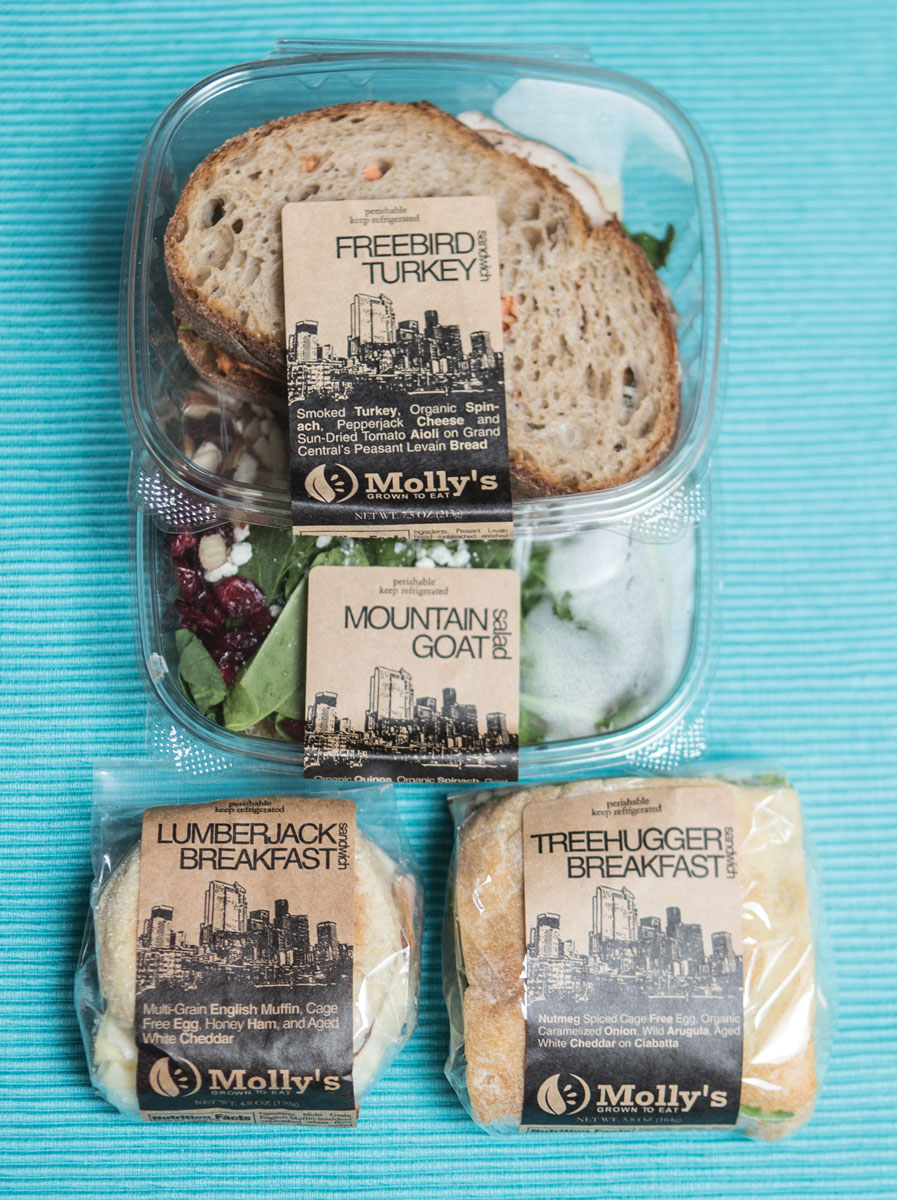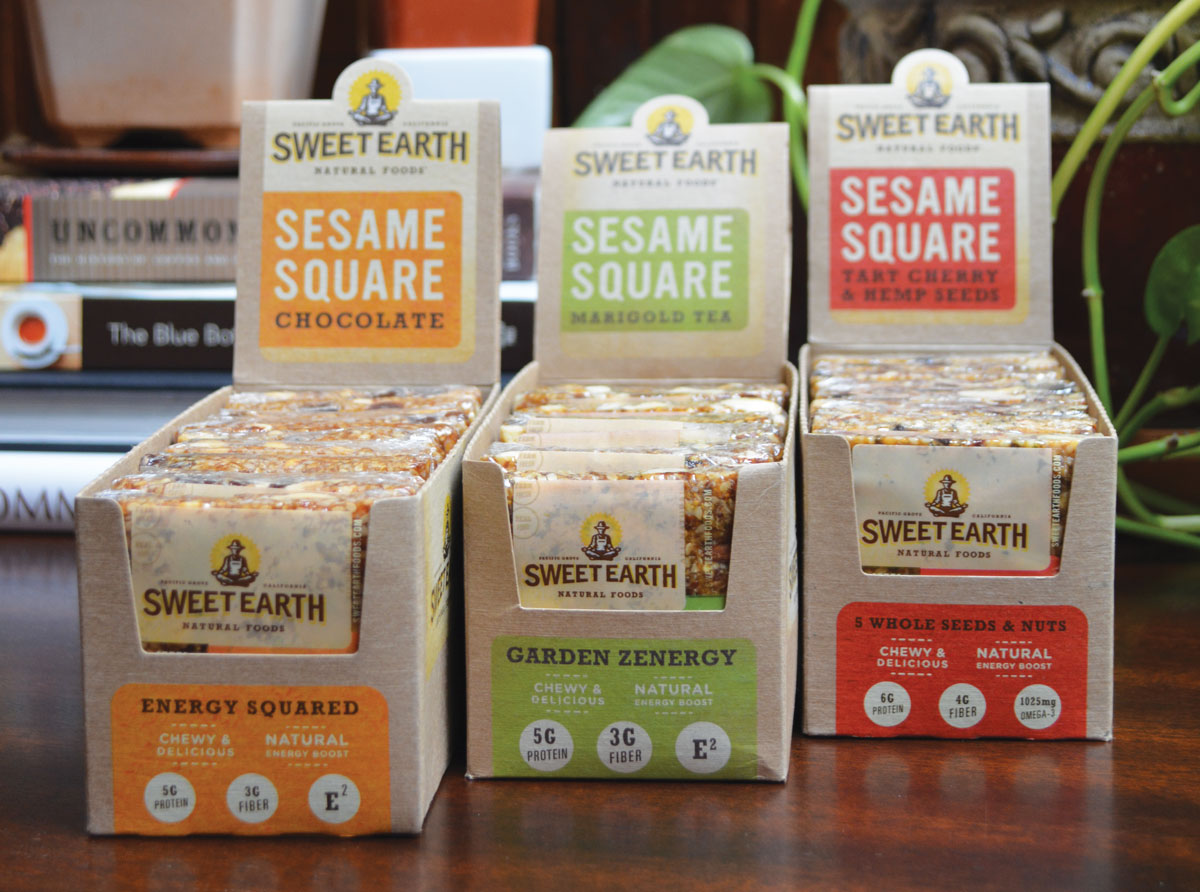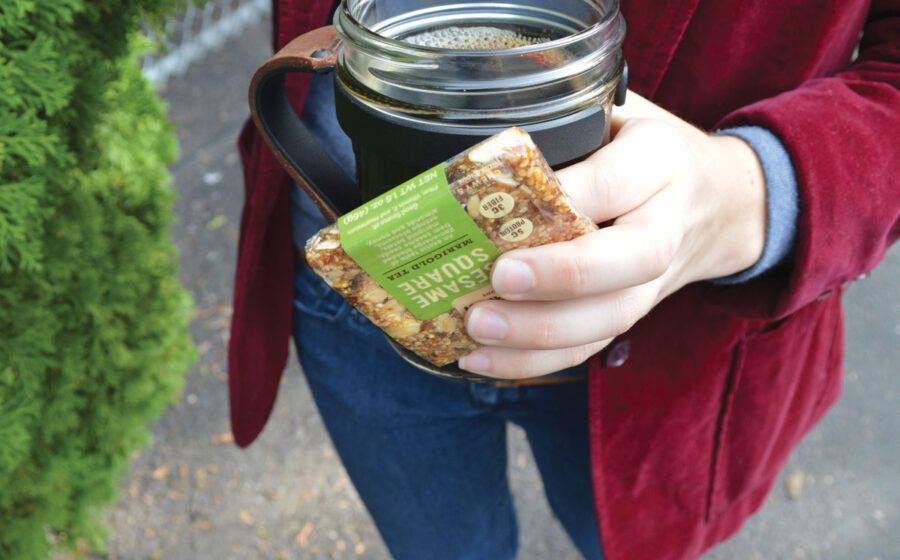[T]here has long been a hole in the café world where good food should reside. Next to coffee and tea, which are treated with reverence and handled carefully from farm to cup, café food has typically been treated as an afterthought. At best, it’s a showcase of local pastries but little else. At worst, it’s a half-forgotten jar of stale biscotti. While many shops are taking food more seriously, sourcing local baked goods made with premium ingredients, finding a proper meal made of satisfying, nutrient-rich items remains rare. To fill that void, makers of healthier ready-to-eat offerings are opening retailer’s eyes to the possibilities of substantial yet hassle-free fare.
Companies focused on healthful grab-and-go exude youthfulness. “Heyyyyyy, enlighten up, man,” reads the banner on Sweet Earth Natural Foods homepage. Scrolling down the page, words like “plant-based,” “Non-GMO,” and “California” catch the eye along with a simple guarantee: “The burrito abides.”
This sort of language is humorous, distinctly wellness-focused and, well, Californian. But its growing prevalence in the ready-to-eat category is nothing to scoff at. More companies—both established and new enterprises itching to break into the health food market—are resting on similar values and ideas, touting those qualities that some might call healthy, while others go so far as enlightened. With consumers clamoring simultaneously for convenience and better-for-you food options, a new kind of grab-and-go case has arrived.

[T]he same customers who demand coffee that can be traced to its farm of origin are approaching food with a similar ethos, with expectations that foods will be sustainable, fairly sourced, and organic. Granola and protein bars are a standby in cafés these days, and that’s because they’re one of the easiest ways for retailers to appeal to this mindset. Affordable and conscientious bars placed next to the register are the first line of defense for any café seeking to offer more “real food” and fewer sweets and starches.
Jesse Malman—who handles public relations for protein bar maker Probar—defines “real food” as protein-rich and plant-based. The concept of plant-based food speaks to vegans and health nuts alike, because it cuts out calories and ingredients from animals and those formulated in the lab. But for the makers of Probar, and many who seek healthful food, sustainable and plant-based nutrition is also a philosophy.
“Somebody can pick up our product and know pretty quickly that they’re getting a high-quality product made with real food and sustainable ingredients,” says Malman, “whereas when somebody picks up a pastry or another item in a coffee shop, tracking where that came from and what’s inside of it just becomes more and more difficult.”
Oatmeal is another way retailers are reaching their health-conscious customers. On-the-go oatmeal cups from companies like Modern Oats and Umpqua Oats incorporate nuts, fruits, and seeds for a filling breakfast that requires little to no effort on the part of the barista. Both brands use groats—minimally processed rolled oats—for more solid texture and higher nutrient content than instant oats. Easy to prepare cups simply require hot water and a stir. Oatmeal is a healthy, nonperishable option for retailers that travels well, and pairs nicely with coffee and tea.
[R]eady-to-eat meals present different challenges. Sandwiches and salads are standard cold-case items, but the kind that are cheap are also typically tasteless, with less than ideal ingredients.

Stefan Kalb lamented the lack of healthy, convenient lunch options while working in downtown Seattle (an area densely populated with high-end coffee and tea). Disappointed by the food options near his tech job, and inspired by his friend Molly, who tackled similar frustrations by crafting artisan salads for her entire office, he launched Molly’s, a wholesale prepared-foods company.
Since its launch in 2009, Molly’s sandwiches, salads, wraps, and granola bars have infiltrated Seattle’s café scene so thoroughly that the specialty coffee food desert there is fading into memory. Capitol Hill retailers like Victrola and Bauhaus benefit from a personalized food program that is low hassle. Molly’s makes the items, delivers them, stocks the shelves, and tracks inventory. The company even buys back what it doesn’t sell in its narrow peak-quality window and donates that food.
“When we started there wasn’t really anybody that was doing what we are doing,” says Kalb. “Most everyone was making sandwiches as cheap as they could. We went to coffee shops and the adoption was pretty phenomenal.”
For Molly’s, keeping cafés stocked with customized orders of fresh food requires extra time and labor on their end, but the payoff is huge in a market demanding the ease and quality their business model offers. Sweet Earth has enjoyed a similar spike in demand. The company, which was born on California’s Monterey coast, now ships burritos, sesame bars, and vegan burgers to shops around the country.
“[Our products] give retailers a chance to offer consumers something that has high protein, high fiber, and the phytonutrients you get from vegetables. I think it really is important to offer a healthy breakfast along with coffee and tea,” says Sweet Earth owner and CEO Kelly Swette.
While the company pokes fun at itself with surfer-speak branding, the “enlightenment” it jokes about and its coastal charm are still inherent in its products, which are mostly vegan and organic, infused with local and global flavors, and handcrafted near Big Sur. Swette is acutely aware of the lack of healthy, portable fare.

“Portability is essential,” she says. “That’s how we ended up getting to the product lines that we carry, we recognized that breakfast is changing, people have less and less time, they want something healthy, and there are very few options.”
Sweet Earth speaks to the shift away from the standard carbohydrate- and sugar-rich snack, but also to changing palates, with items incorporating more adventurous ingredients like lentils, curried seitan, goat cheese, and spirulina. One of Sweet Earth’s best-selling burritos in San Francisco is the Kyoto, featuring adzuki beans, bok choy, edamame, and ginger.
More traditional flavors in a similar style can be found in Burrito Kitchen’s all-natural burritos, which come in both gluten-free and vegetarian varieties, appealing to the growing percentage of consumers with allergies or restrictive diets. There are a variety of ways to reach hurried, hungry customers, microwaveable burritos being one of the easiest to ship and prepare.
[T]he café has long been a place for indulgence—whether coffees and teas from faraway lands, rich pastries, or sugary beverages laced with caffeine. But with consumers rethinking their tastes and opting for food that’s hearty and wholesome, sustainable, earth-friendly, and a good pair with coffee or tea, the café menu is shifting. Small changes, like implementing oatmeal, selling protein-rich snacks, and adding kombucha to ready-to-drink offerings will excite customers looking to feel healthier. But substantial, convenient food will have them returning for breakfast, lunch, or dinner, in addition to their afternoon pick-me-up.
—Regan Crisp is Fresh Cup’s associate editor. Photos by Cory Eldridge and Cynthia Meadors.
















